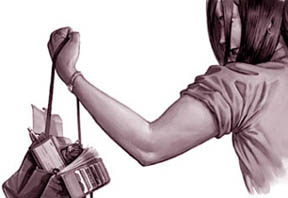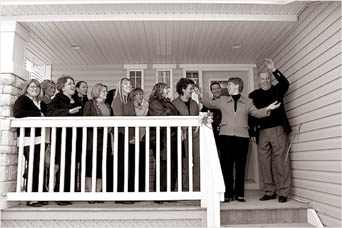|
observer |
|
|
|
|
|
OTHER LINKS |

|

|

|
Things you have to know:What do women want?The kitchens in the company's homes, the women said, were all wrong. The pantries were tiny, and the sinks needed to overlook a window so kids in the backyard could be monitored. And the mudrooms!
"Shane Homes had the revolutionary idea of asking women what they wanted in a home," said Joanne Thomas Yaccato, a Toronto consultant and author who advised the company on female consumers. "The revolutionary part is that they not only listened, they actually built the darn thing." Shane Homes is hardly alone. More companies, in the United States and elsewhere, have realized that they overlook women at their own financial peril. The companies are realigning their marketing and design practices, learning to court an increasingly female-centric consumer base that boasts more financial muscle and purchasing independence than ever before. "We are perhaps on the first step to a matriarchal society; women will earn more money than men if current trends continue by 2028," said Michael J. Silverstein of the Boston Consulting Group. "The trend has been escalating in the last 10 years as there has been a gradual, slow erosion of the power balance in the family, a psychic rebalancing." Women, Mr. Silverstein added, are "controlling purchases and driving a shift in our economy." At American colleges and universities, women represent 57 percent of undergraduate classes and 58 percent of graduate classes, according to the American Council on Education.
But some big retailers say they are, in fact, well aware of where purchasing power resides. Best Buy, for example, "used to be a boy store, built by boys, for boys, but four to five years ago, there was a dramatic flip," said Julie Gilbert, a vice president with the company. "Women are outspending men in our industry $55 billion to $41 billion," Ms. Gilbert said. "Not only that, they are actually influencing 90 percent of the purchases. It is a new day in consumer electronics." The same may be true in financial services. MassMutual, which recently introduced "Pearls of Wisdom," a video-based financial seminar, and added a women's page to its Web site, has taken the approach a step further. In August, it started a "Selling to Women" educational series to help its agents understand women's expectations and needs. Health care was the first industry to recognize and adapt to female buyers because it was clear that women were the gatekeepers for most families' health needs, according to Marti Barletta, president of the TrendSight Group, a research firm in Winnetka, Ill. Financial services was next, followed by home improvement and consumer electronics, she said, as marketers followed the money trail. While women have always influenced decisions about big-ticket household purchases, their direct spending has expanded substantially in recent years. Women accounted for 33 percent of the purchases at big-box retailers in 2005, up from 28 percent in 2003, according to the NPD Group, a consumer research firm. "That's a huge shift," said Mark J. Delaney, an NPD analyst, "not to be taken lightly." To be sure, some companies have been examining the needs and interests of female consumers for years. The advertising agency Leo Burnett USA and its LeoShe division created its Girlfriend Groups research services in the 1990s to help clients understand how customers approach brands. The women are part of a larger group of mostly single women, aged 32 to 40, many of whom graduated from Virginia Tech and meet once a month for group suppers. They have travelled to places like Las Vegas and New York. For about $300 each, they booked a suite with two adjoining bedrooms and converted it into a party pad. When they arrived, the hotel gave them gift bags containing OPI nail polish that they swapped among themselves, based on their colour preferences. They dined in the hotel's restaurant and then returned to their suite for a private Texas Hold 'Em lesson from a poker expert, while the hotel sent up a steady flow of cocktails and snacks. "We really had a good time," Ms. Krause said. "We played a round of blackjack, and craps, too." The Glam Girls package is part of the company's Women in Touch program, the brainchild of Ms. Leondakis. The program, now two years old, offers special promotions and amenities to female guests. "I'm on the road so much," Ms. Leondakis said. "I generally found that hotels didn't cater to the specific needs of women travellers." Kimpton says 48 percent of its guests are women - compared with a lodging industry norm of 42 percent - and it addresses their needs with rooms that offer more lighting and closet space, better mirrors, bathroom shelves, hand-held steamers and items like razors and toothpaste. There are also in-room wellness programs featuring yoga, Pilates and meditation. And don't forget in-room safes. "We like to travel with jewellery and we don't want to wait in line at the front desk," Ms. Leondakis said. Data suggests that women are feeling quite confident. According to the NPD Group, women bought 47 percent of all painting supplies sold in the United States in June, up from 42 percent in 2003. And they buy about half of all new bathtubs, up from 35 percent. "The main difference is that women are beginning to understand their purchasing power," she said. "They are now beginning to demand better treatment and have gotten their voice." While there are some other valuable auto-buying sites for women, like Edmunds.com, Ms. DeVere said, AskPatty is different in that "it is from women by women, but more than that, AskPatty is heartfelt. It's not just words and information." |
 They shared space with laundry rooms, meaning that dirty floors might
sit right beneath clean laundry. ("It's called a mud/laundry room?" one
incredulous woman asked.) After that, Shane Homes subjected designs to
similar grillings - before they were built - and adapted them
accordingly.
They shared space with laundry rooms, meaning that dirty floors might
sit right beneath clean laundry. ("It's called a mud/laundry room?" one
incredulous woman asked.) After that, Shane Homes subjected designs to
similar grillings - before they were built - and adapted them
accordingly.  "Women are making 70 percent of travel decisions, for the family, for
their own getaways or for people at work," said Niki Leondakis, the
chief operating officer of Kimpton Hotels and Restaurants in San
Francisco. "It's surprising that more people are not including women in
their marketing."
"Women are making 70 percent of travel decisions, for the family, for
their own getaways or for people at work," said Niki Leondakis, the
chief operating officer of Kimpton Hotels and Restaurants in San
Francisco. "It's surprising that more people are not including women in
their marketing." 







